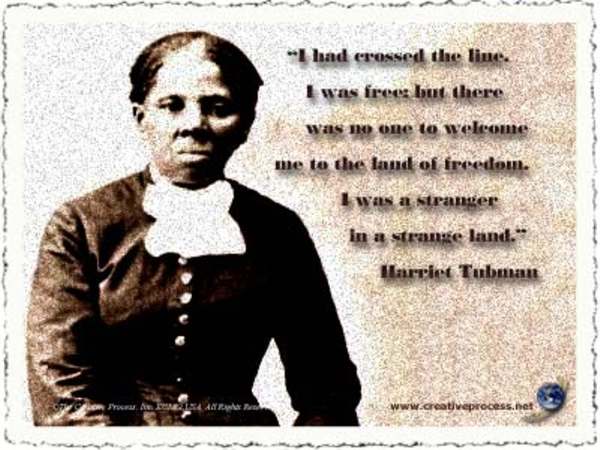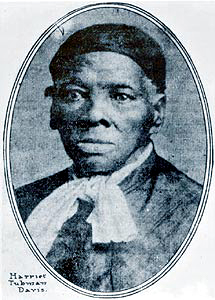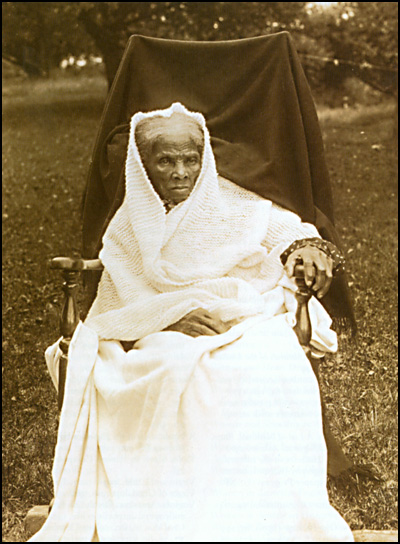
APRIL 2004

THAT MAGNIFICENT
'GEN'RAL MOSES' - HARRIET TUBMAN
==============================================
[Col. Writ. 3/11/04] Copyright 2004 Mumia Abu-Jamal
It has been 91 years since her passing
from this vale of mortal tears.
This week marks 91 years since the
death of a woman who was, even during her life, a legend
-- Harriet Tubman.
Born near Tidewater, in bondage in
Maryland, to Harriet and Ben Ross, she was named
Araminta, which was shortened to her 'basket' name of
Minta, or 'Minty', until she was about 6 years old, when
she would be called, after her mother, Harriet.
When? 1820 ... or perhaps, 1821, for history books are
unsure.
What they are sure of is her strong
determination to free herself, and her people, again, and
again, and again -- against monstrous, deadly odds.
Her name has survived into this new
century, but who, among the young, knows what the
'Underground Railroad' was?
Who knows that those people who formed
it, and who used it, Black and White, were daily breaking
the law, and faced serious consequences for doing
so? For Blacks, they risked violence,
re-enslavement, and sometimes death; for whites, serious
civil penalties, and sometimes jail.
Thomas Garrett, a Delaware Quaker,
believed in freedom, and he offered food and shelter to
any runaway slave who could make it to his home in
Wilmington, since 1822. In Spring, 1843, Garrett,
John Hunn, and another man were tried at the U.S. Court
in New Castle, where Chief Justice Roger Taney (later of
*Dred Scott* infamy) and Judge Hall were sitting.
The fines and damages against him cost
him every dollar he owned, and all of his household
effects were sold at public auction. The sheriff
running the sale turned to him, saying, "Thomas, I
hope you'll never be caught at this again."
The then-60-year-old man replied,
"Friend, I haven't a dollar in the world, but if
thee knows a fugitive anywhere on the face of the earth
who needs a breakfast, send him to me."
 Harriet
Tubman was part of that network, and when she made her
way to freedom in 1849, she walked the streets of
Philadelphia, marveling at the number of
"colored" people she saw, and how they spoke,
and what nice clothes they wore. In time, she
learned they too, were fugitive slaves, like
herself. She resolved to do something about
it. This "Underground Railroad' had assisted
her, fed her, and gave her shelter, when she walked from
Dorchester County, Maryland, to Philadelphia,
Pennsylvania. She got herself a pistol, and she
went back down.
Harriet
Tubman was part of that network, and when she made her
way to freedom in 1849, she walked the streets of
Philadelphia, marveling at the number of
"colored" people she saw, and how they spoke,
and what nice clothes they wore. In time, she
learned they too, were fugitive slaves, like
herself. She resolved to do something about
it. This "Underground Railroad' had assisted
her, fed her, and gave her shelter, when she walked from
Dorchester County, Maryland, to Philadelphia,
Pennsylvania. She got herself a pistol, and she
went back down.
As this was now 1851, a year after the
passage of the ugly Fugitive Slave Act, which made the
whole country open to lave-raids and kidnappers, she
resolved to go back down, to now carry her charges
"clear off to Canada," for Tubman could not
longer "trust my people with Uncle Sam..."
(from Ella Forbes', *'But We Have No Country': The 1851
Christiana Pennsylvania Resistance*; Africana Homestead
Legacy, 1998; pp. 114-15).
And woe to the fool who, tired, scared, or indecisive,
wanted to turn back. Harriet would draw her pistol,
aim it at the timid, and say simply, in her husky,
low-pitched voice, "Go with us or die." They
invariably chose life. The fugitives could not
afford anyone going back, she would later explain.
They would talk. They would be *forced* to talk;
and all would be lost. She would say, "We got
to go free or die. And freedom's not bought with
dust."
She personally brought at least 300
souls, men, women and children, out of bondage. She
was a soldier, dedicated to the freedom of her people,
with a $40,000 bounty on her head. In 1863, during the
Civil War, she guided 300 Black soldiers in the Combahee
River Raid, where millions of dollars worth of Southern
property, dwellings, cotton and such were destroyed, and
nearly 800 captives were freed. Said Tubman, "I
never saw such a scene! I laughed and laughed and
laughed."
What delighted her, what thrilled her,
was the freedom of her people. Let us *all*
remember her,
forever!
Copyright 2004 Mumia Abu-Jamal
[Mr. Jamal's latest work, *Faith of our Fathers* (Africa
World
Press) is available at fine/rad bookstores everywhere.]
[Sources: Butch Lee, *Jailbreak Out of History:
The Re-Biography of Harriet Tubman* (Stoopside
Books, 2000); Ann Petry, *Harriet Tubman:
Conductor On the Underground Railroad*
(HarperCollins, 1955/1983); (Forbes, cited).]
